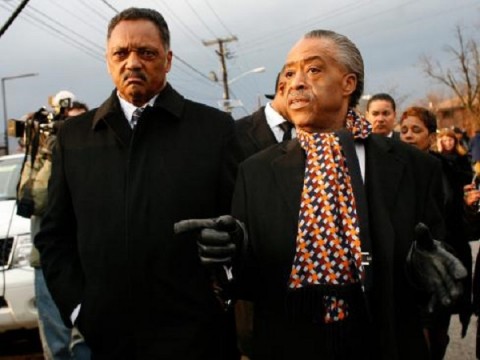It might sound dramatic, but Rev. Al is speaking on the real. Via HuffingtonPost MSNBC was the first cable news network to turn to the news of the Supreme Court’s ruling on the Voting Rights Act on Tuesday. Both MSNBC and NBC simultaneously aired legal correspondent Pete Williams’ take on the case. Williams said that the Court had struck down a “key part” of the Act by ruling that one of its sections was unconstitutional. “It’s a huge defeat for the civil rights community on the most important civil rights law ever passed,” he said. That view was echoed across other networks. ABC’s Terry Moran, for instance, said that “right now, there is no Voting Rights Act operative in the United States.” Speaking on MSNBC, Al Sharpton called the news “devastating.” Later, he said the Court had “revoked” and “canceled” part of Martin Luther King’s “dream.” For those that are unaware of what the Voting Rights Act is, take a few minutes to soak up the game. Via HuffingtonPost The Supreme Court struck down Section 4 of the Voting Rights Act on Tuesday, the provision of the landmark civil rights law that designates which parts of the country must have changes to their voting laws cleared by the federal government or in federal court. The 5-4 ruling, authored by Chief Justice John Roberts and joined by Justices Antonin Scalia, Anthony Kennedy, Clarence Thomas and Samuel Alito, ruled in Shelby County v. Holder that “things have changed dramatically” in the South in the nearly 50 years since the Voting Rights Act was signed in 1965. The court’s opinion said it did not strike down the act of Congress “lightly,” and said it “took care to avoid ruling on the constitutionality of the Voting Rights Act” in a separate case back in 2009. “Congress could have updated the coverage formula at that time, but did not do so. Its failure to act leaves us today with no choice but to declare [Section 4] unconstitutional. The formula in that section can no longer be used as a basis for subjecting jurisdictions to preclearance.” The Voting Rights Act has recently been used to block a voter ID law in Texas and delay the implementation of another in South Carolina. Both states are no longer subject to the preclearance requirement because of the court’s ruling on Tuesday. “Our country has changed, and while any racial discrimination in voting is too much, Congress must ensure that the legislation it passes to remedy that problem speaks to current conditions,” Roberts wrote. “There is no doubt that these improvements are in large part because of the Voting Rights Act,” he wrote. “The Act has proved immensely successful at redressing racial discrimination and integrating the voting process.” Clearly, not everyone agrees… Justice Ruth Bader Ginsburg issued a wide-ranging dissent on behalf of herself and Justices Stephen Breyer, Sonia Sotomayor, and Elena Kagan, justifying the continued vitality of the Voting Rights Act’s preclearance provision. “The sad irony of today’s decision lies in its utter failure to grasp why the VRA has proven effective,” Ginsburg wrote. “The Court appears to believe that the VRA’s success in eliminating the specific devices extant in 1965 means that preclearance is no longer needed.” The court did not rule on Section 5 of the Voting Rights Act, the preclearance requirement itself, which requires those affected states to have changes to their voting laws cleared by the Justice Department or a federal court in Washington, D.C., before they go into effect. Rather, the court ruled that the current formula that determines which states are covered by Section 5 is unconstitutional, effectively eliminating Section 5 enforcement, at least for the time being. “In the Court’s view, the very success of §5 of the Voting Rights Act demands its dormancy,” Ginsburg wrote. She said in her bench statement that in renewing Section 5 in 2006, Congress “found that 40 years has not been a sufficient amount of time to eliminate the vestiges of discrimination following nearly 100 years of disregard for the 15th Amendment.” In summary, this means that changes in states’ voting laws no longer need review on the federal level. Which also means that if a state were to decide to make things harder for blacks and people of color to vote then there would no system in place to counter balance any foolery that might be afoot. We’re sure all the political talkin’ heads will be chirping about this issue all night. We suggest that you educate yourself on these laws and teach others how it will affect them. Image via AP

























